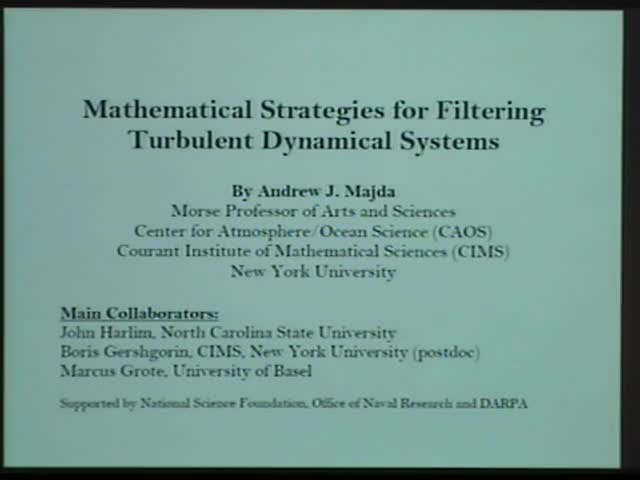Mathematical Strategies for Filtering Turbulent Dynamical Systems
Presenter
April 13, 2011
Keywords:
- Turbulent flows
MSC:
- 76F70
Abstract
An important emerging scientific issue in many practical problems ranging from climate and weather prediction to biological science involves the real time filtering and prediction through partial observations of noisy turbulent signals for complex dynamical systems with many degrees of freedom as well as the statistical accuracy of various strategies to cope with the “curse of dimensions”. The speaker and his collaborators, Harlim (North Carolina State University), Gershgorin (CIMS Post doc), and Grote (University of Basel) have developed a systematic applied mathematics perspective on all of these issues. One part of these ideas blends classical stability analysis for PDE's and their finite difference approximations, suitable versions of Kalman filtering, and stochastic models from turbulence theory to deal with the large model errors in realistic systems. Many new mathematical phenomena occur. Another aspect involves the development of test suites of statistically exactly solvable models and new NEKF algorithms for filtering and prediction for slow-fast system, moist convection, and turbulent tracers. Here a stringent suite of test models for filtering and stochastic parameter estimation is developed based on NEKF algorithms in order to systematically correct both multiplicative and additive bias in an imperfect model. As briefly described in the talk, there are both significantly increased filtering and predictive skill through the NEKF stochastic parameter estimation algorithms provided that these are guided by mathematical theory. The recent paper by Majda et al (Discrete and Cont. Dyn. Systems, 2010, Vol. 2, 441-486) as well as a forthcoming introductory graduate text by Majda and Harlim (Cambridge U. Press) provide an overview of this research.
